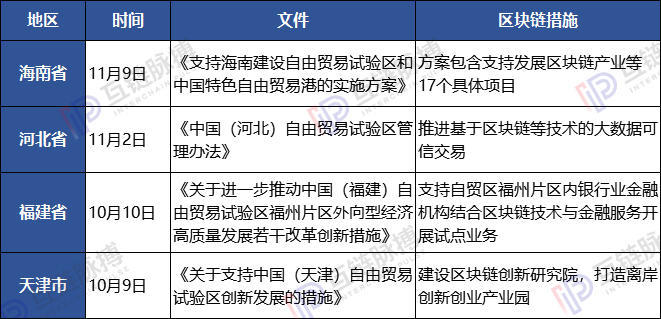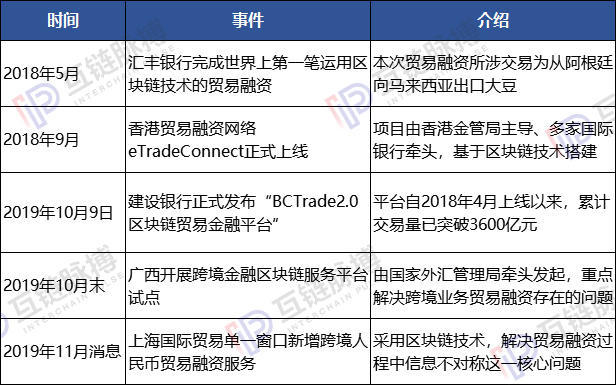This article understands trade and blockchain integration policy measures. Chinese companies and organizations have done these.
Text | Interchain Pulse · Golden Walker
On the evening of November 28, the "Guiding Opinions of the State Council of the Communist Party of China on Promoting the High-quality Development of Trade" was released. The "Opinions" clearly stated that we must promote the organic integration of the Internet, the Internet of Things, big data, artificial intelligence, blockchain and trade, and accelerate the cultivation of new momentum.
In the previous two months, multiple documents in various regions of the country also mentioned that the use of blockchain technology has helped the development of the trade field (see the table below for details).

- Inventory: 10 most active cryptocurrency investment funds in 2019
- Observation 丨 Undocumented is better than evidence-the combination of virtual and real identity
- Ban cryptocurrency payments? Even Russia ’s own officials find it difficult
(Tabulation: interlink pulse)
It can be seen that in the context of Sino-US trade friction, the Chinese government is paying more and more attention to and encouragement, and the application of blockchain technology in the field of trade has landed. In which part of the trade should the blockchain play a role?
Interchain Pulse understands that commercial trade is generally divided into production-led production links, commodity purchase links, commodity storage and transfer links, and consumer-focused consumption links. And blockchain technology can almost participate in the entire process of commercial trade mentioned above.
The first is the field of trade finance throughout the entire trade chain. Blockchain can be used to record and share data on trade financing and trade settlement; secondly, in terms of trade logistics, the blockchain can support the authenticity of logistics and transportation; and it is compatible with logistics At the consumer's end, blockchain can also promote the realization of trade traceability.
Blockchain trade finance is a key town for the "national team"
To understand the combination of blockchain and trade finance, we must first understand its concept. Trade finance is an integrated financial service that runs through the entire trade chain, including trade settlement, trade financing, credit guarantee, hedging, and financial management. Among them, trade finance is the field that is most closely integrated with the blockchain.
There are many blockchain projects in this field, but the first is the project of the national team.
Yesterday's news (November 28), the Bank of Communications stated that it has now joined the People's Bank of China's trade finance blockchain platform and joined the China Banking Association's "China Trade Finance Interbank Transaction Blockchain Platform" as a core node.
The "People's Bank of China Trade Finance Blockchain Platform" mentioned by the Bank of Communications is a fintech infrastructure initiated and created by the Central Bank, the Digital Currency Research Institute and the People's Bank of China Shenzhen Branch, September 4, 2018 Trial run on the line. The platform is based on the underlying blockchain technology independently developed by the Central Bank's Digital Currency Research Institute. It puts together data from banks and related companies, and aggregates the capital flow, account receivables, and industrial and commercial, judicial, and tax data of loan companies.
It is reported that as of the end of October 2019, there were 29 banks and 485 outlets participating in the promotion and application in Shenzhen, and 1,898 companies that had business operations, achieving more than 30,000 business on-chain transactions and more than 5,000 business transactions. The amount is about 75 billion yuan.
Bank of Communications mentioned another "China Trade Finance Interbank Transaction Blockchain Platform", which is led by the China Banking Association, with 11 leading banks such as CCB and ICBC, as well as 4 technology companies such as Hang Seng and Nanjing Runchen Participate in the construction of a bottom-level platform for trade finance based on blockchain technology. After successfully completing the two phases of testing, the platform was officially launched at the end of December 2018.
News on November 15th, the platform has realized more than 30,000 business on-chain transactions, more than 6,100 business transactions, and a business volume of about 76 billion yuan. Currently, 30 banks have access to the central bank's trade finance blockchain platform.
In addition, the pulse of the mutual chain also concerned that not only the central bank and the China Banking Association are promoting the combination of blockchain and trade finance, but also the corresponding arrangements of the State Administration of Foreign Exchange, the Hong Kong Monetary Authority, HSBC and other institutions.
As recently reported in November, the Shanghai International Trade Single Window added cross-border RMB trade financing services and adopted blockchain technology to solve the core issue of information asymmetry in the trade financing process.
At the end of October, Guangxi launched a pilot of a cross-border financial blockchain service platform, which was led by the State Administration of Foreign Exchange. The platform uses blockchain technology to reconstruct the existing export trade receivables trade financing process, focusing on solving the problems of cross-border business trade financing.

(Tabulation: interlink pulse)
By observing the application of the above-mentioned trading platform's blockchain technology, the mutual chain pulse found that they mainly use the characteristics of the blockchain to serve the mutual trust, information recording and sharing, and supervision of enterprises in the field of trade finance.
1. The application of blockchain technology in the field of trade finance can effectively promote the formation of market trust mechanisms and help enterprises to achieve trade financing.
2.Blockchain helps to record the core data of trade financing business, enables trade participants to quickly obtain real information, and can quickly advance transaction execution, thereby reducing the total cost of corporate financing.
Third, through the application of blockchain technology, the supervisory department can conduct penetrating supervision on the entire process and life cycle of trade finance to effectively prevent financial risks.
Blockchain Trade Logistics: Accelerating Trade Circulation
Blockchain trade finance mainly covers the first and last ends of the trade process, while the storage and transfer of goods is responsible for the middle part of trade, which mainly involves logistics and customs clearance in cross-border trade.
Mutual Chain Pulse is concerned that in terms of logistics operation and customs clearance, related enterprises and departments in China have also carried out corresponding practices.
As early as April 2018, in the Sinopec Group's Sinochem Energy Technology Co., Ltd.'s petrol export business from Quanzhou, China to Singapore, Xiamen Customs successfully participated in a pilot export transaction for blockchain applications. It is reported that this project is the world's first energy trade blockchain application project involving government departments.
In addition, recently relevant departments and organizations are actively exploring the combination of blockchain and intermediate links in trade.
On October 17, 2019, Shanghai Customs set up a monitoring center on the spot, established an informatization management system for customs and enterprises' books, and recorded the entire process of goods in, out, storage, and sales. Blockchain will also be introduced in the near future. By collecting the main data of each link of the import, the information of the entire process of the goods is recorded retrospectively.
On October 23, the cross-border blockchain platform "China-Europe e-Single Link" was officially launched. The platform was developed by the head office of the Industrial and Commercial Bank of China. By combining the blockchain technology with the various business links of the multimodal transport "one order system", the parties are linked to provide trade logistics information support for SME financing.
On November 28, the Shandong Port Rizhao Port Logistics Blockchain Platform was released. This is the first blockchain platform of Rizhao Port, which has positive significance for promoting the deep integration of port and port supervision and logistics finance.
The reason why blockchain technology can play a role in the transfer of goods and the clearance of goods is that it also helps the enterprises in the link to trust each other, the fidelity of goods, the improvement of operating efficiency, and the realization of supervision.
I. There are many participants involved in the trade logistics sector. The construction of a consensus mechanism based on blockchain technology to remove the trust system of third parties can promote the realization of trust between participants and reduce the cost of corporate interaction.
Second, the use of blockchain can make the participants in each link of the logistics program act as nodes in the network, thereby promoting the transparency and authenticity of information in the logistics process.
Third, the use of blockchain technology to digitize the core documents of key links in trade logistics can effectively improve the efficiency of contract execution, inspection, cargo clearance, settlement and delivery of goods.
Fourth, building an open network that is both transparent and fully protects the privacy of all parties through the blockchain can not only improve the risk control capabilities of upstream and downstream companies in the logistics supply chain, but also help the customs to supervise trade links.
In addition to trade finance and trade logistics, based on the combination of blockchain and logistics, when the goods belong to consumers, the traceability of trade is also an implementation possibility of blockchain technology in the field of trade.
Blockchain or China will become a "soft weapon"
In the traditional trade process in the past, problems such as lack of trust, data silos, inefficient process collaboration, and platform centralization are all bottlenecks faced by participants. The technical characteristics of blockchain can effectively solve the above problems.
The country is also concerned about this point. Following the promotion of the blockchain to a national strategic height on October 24, it also proposed to combine the blockchain with the trade field yesterday to promote innovation-driven development.
As a "soft weapon" blockchain technology, it has now been implemented in the fields of finance, logistics, and traceability, and its future application in the field of trade is also worth looking forward to.
This article is the original [Interlink Pulse], please indicate the source when reproduced!
We will continue to update Blocking; if you have any questions or suggestions, please contact us!
Was this article helpful?
93 out of 132 found this helpful
Related articles
- Blockchain 丨 Bakkt CEO will become Georgia senator, Bitcoin is expected to enter mainstream US politics
- Interview with Li Ming of the Ministry of Industry and Information Technology: Understanding Decentralization of Blockchain with Cross-border Transactions and Cold Chain Logistics
- People's Daily Online: How do countries welcome the advent of the blockchain era?
- Was Telegram defended, was the "extra" 6 months to fight enough?
- Is an exchange losing $ 250 million in cryptocurrencies a Ponzi scheme: Quadriga Bizarre Story
- Opinion: Excessive speculation that privacy coins will die
- Babbitt launches "strict selection platform for industrial blockchain", 3 major services help technology landing






